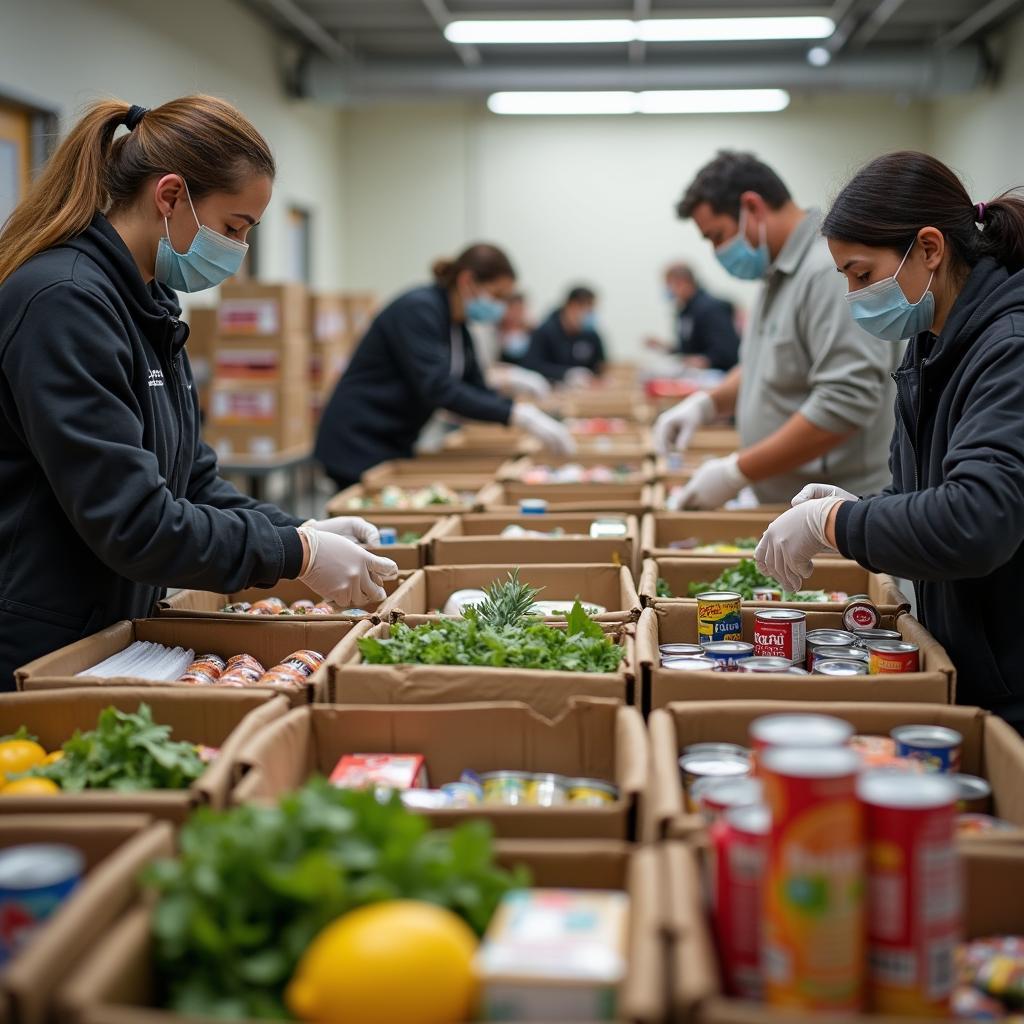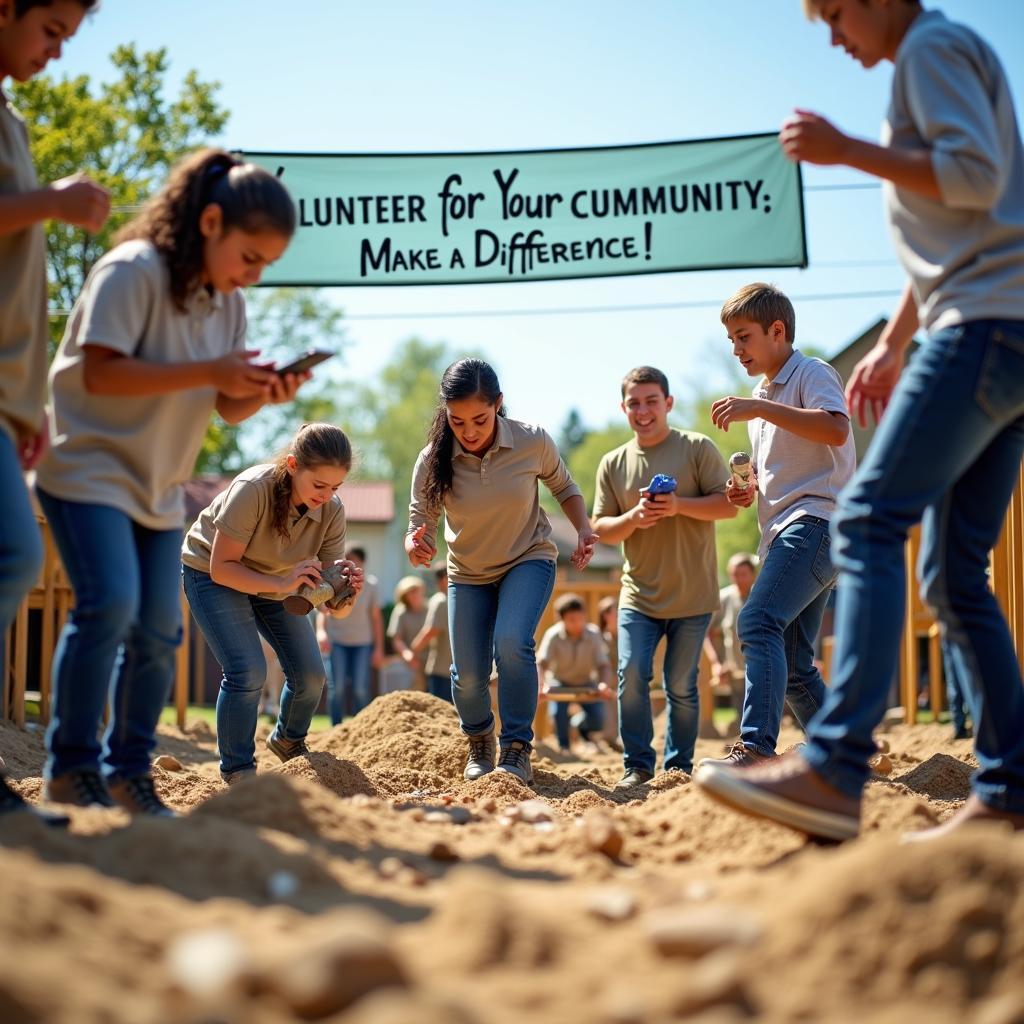The COVID-19 pandemic has undoubtedly impacted our lives in numerous ways, including creating new opportunities for volunteering. In recent IELTS Speaking tests, examiners have shown increased interest in candidates’ experiences during this unprecedented time. This article will guide you through answering questions about volunteering during the pandemic, helping you showcase your language skills and personal growth.
Nội dung bài viết
- Part 1: Introduction and Interview
- Have you ever done any volunteer work?
- Do you think volunteering is important?
- Part 2: Long Turn (Cue Card)
- Describe a time when you volunteered for a cause during the pandemic
- Follow-up Questions
- Part 3: Two-way Discussion
- How do you think governments can encourage more people to volunteer?
- Do you believe that volunteering should be mandatory for all citizens? Why or why not?
- How do you think the role of volunteers in society might change in the future?
- Key Vocabulary and Phrases for High Scores
- Examiner’s Advice
Part 1: Introduction and Interview
In this section, the examiner may ask general questions about volunteering. Here are some potential questions and sample answers:
Have you ever done any volunteer work?
Band 6-7 Answer:
Yes, I have. During the pandemic, I volunteered at a local food bank to help distribute supplies to those in need.
Band 8-9 Answer:
Absolutely. I’ve been involved in various volunteer activities, but the most meaningful experience was during the height of the pandemic when I dedicated my time to a local food bank. It was an eye-opening opportunity to support my community during such a challenging period.
Do you think volunteering is important?
Band 6-7 Answer:
Yes, I believe volunteering is important because it helps people in need and makes our community better.
Band 8-9 Answer:
I firmly believe that volunteering plays a crucial role in society. It not only provides essential support to those in need but also fosters a sense of community and social responsibility. Moreover, volunteering can be an enriching experience for the volunteers themselves, offering personal growth and a broader perspective on societal issues.
Part 2: Long Turn (Cue Card)
In this section, you’ll be given a cue card with a topic to speak about for 1-2 minutes. Here’s a sample cue card related to volunteering during the pandemic:
Describe a time when you volunteered for a cause during the pandemic
You should say:
- What the cause was
- How you got involved
- What you did as a volunteer
- How this experience affected you
Band 6-7 Sample Answer:
During the pandemic, I volunteered for a local food bank. I got involved after seeing a post on social media asking for help. As a volunteer, I helped sort and pack food items, and sometimes I delivered packages to elderly people who couldn’t leave their homes. This experience made me more aware of the difficulties some people face and made me feel good about helping others.
Band 8-9 Sample Answer:
During the unprecedented times of the COVID-19 pandemic, I had the privilege of volunteering for a local food bank that was facing an overwhelming demand for its services. I became involved after coming across an urgent appeal on social media, which struck a chord with me as I realized the dire situation many in our community were facing.
As a volunteer, my responsibilities were multifaceted. I primarily assisted in sorting and packaging food items, ensuring that each box contained a balanced assortment of nutritious goods. Additionally, I participated in the contactless delivery program, where we would discreetly leave food packages at the doorsteps of vulnerable individuals, particularly the elderly and those with underlying health conditions who were advised to self-isolate.
 Volunteers wearing protective masks diligently sorting and packing essential food supplies in a busy food bank during the COVID-19 pandemic.
Volunteers wearing protective masks diligently sorting and packing essential food supplies in a busy food bank during the COVID-19 pandemic.
This experience was truly eye-opening and had a profound impact on me. It heightened my awareness of the socioeconomic disparities within our community and the precarious situations many people found themselves in due to job losses or health issues. Moreover, it instilled in me a deeper sense of social responsibility and community spirit. The gratitude expressed by the recipients was incredibly humbling, and it reinforced the notion that even small acts of kindness can make a significant difference in someone’s life.
Ultimately, this volunteering experience broadened my perspective on societal issues and ignited a passion for community service that I intend to carry forward long after the pandemic subsides.
Follow-up Questions
- How did volunteering during the pandemic differ from regular volunteering?
Band 6-7 Answer:
Volunteering during the pandemic was different because we had to follow safety rules like wearing masks and keeping distance. We also had to be more careful when helping people who were at high risk.
Band 8-9 Answer:
Volunteering during the pandemic presented unique challenges and required significant adaptations. The most notable difference was the stringent safety protocols we had to adhere to, including wearing personal protective equipment and maintaining social distancing. These measures were crucial for protecting both volunteers and recipients but sometimes made the work more challenging and less personal. Additionally, the urgency and scale of need were unprecedented, requiring us to be more efficient and innovative in our approach to helping others.
 Volunteers meticulously adhering to strict COVID-19 safety protocols, wearing PPE and maintaining social distance while distributing aid.
Volunteers meticulously adhering to strict COVID-19 safety protocols, wearing PPE and maintaining social distance while distributing aid.
- Do you think the pandemic has changed people’s attitudes towards volunteering?
Band 6-7 Answer:
Yes, I think the pandemic has made more people want to volunteer. People saw how important it was to help each other during difficult times.
Band 8-9 Answer:
I believe the pandemic has substantially altered people’s perspectives on volunteering. The crisis highlighted the interconnectedness of our communities and the critical role that volunteers play in supporting society during challenging times. This realization has sparked a surge in volunteer interest across various demographics. Moreover, the pandemic has broadened the scope of volunteering, introducing virtual and remote opportunities that have made it more accessible to a wider range of people. This shift has potentially created a lasting impact on how people view and engage in community service.
Part 3: Two-way Discussion
In this section, the examiner will ask more abstract questions related to the topic. Here are some potential questions and sample answers:
How do you think governments can encourage more people to volunteer?
Band 6-7 Answer:
I think governments can encourage volunteering by promoting it more in schools and media. They could also give some benefits to people who volunteer regularly, like tax breaks or special recognition.
Band 8-9 Answer:
Governments can play a pivotal role in fostering a culture of volunteerism through various strategic initiatives. Firstly, integrating community service into educational curricula from an early age can instill a sense of social responsibility in young people. Additionally, governments could implement incentive programs, such as tax deductions or credits for volunteer hours, to make volunteering more appealing to a broader demographic.
Furthermore, launching public awareness campaigns that highlight the societal impact of volunteering can help shift public perception and motivate more individuals to get involved. Governments could also partner with private sector organizations to create corporate volunteering programs, potentially offering incentives to businesses that encourage employee participation in community service. Lastly, investing in volunteer management infrastructure and providing training opportunities for volunteer coordinators can help ensure that volunteering experiences are well-organized and fulfilling, thereby encouraging long-term commitment.
 A diverse group of citizens, including students and professionals, engaged in a vibrant community volunteering project, possibly with a public awareness campaign banner promoting service.
A diverse group of citizens, including students and professionals, engaged in a vibrant community volunteering project, possibly with a public awareness campaign banner promoting service.
Do you believe that volunteering should be mandatory for all citizens? Why or why not?
Band 6-7 Answer:
I don’t think volunteering should be mandatory because it might lose its meaning if people are forced to do it. However, I believe it should be strongly encouraged and maybe even rewarded in some way.
Band 8-9 Answer:
While the idea of mandatory volunteering might seem appealing at first glance, I believe it contradicts the fundamental spirit of volunteerism, which is rooted in genuine altruism and free will. Making it compulsory could potentially diminish the intrinsic motivation and satisfaction that comes from choosing to help others voluntarily.
However, I do believe that governments and societies should actively promote and facilitate volunteering opportunities. This could be done through educational initiatives that emphasize the value of community service, creating more accessible pathways for people to engage in volunteer work, and recognizing and celebrating the contributions of volunteers.
A balanced approach might involve integrating community service into educational curricula or offering incentives for volunteering, such as credits towards higher education or professional development. This way, we can foster a culture of volunteerism without making it feel like an obligation, thereby preserving the genuine spirit of giving that makes volunteering so impactful.
How do you think the role of volunteers in society might change in the future?
Band 6-7 Answer:
I think volunteers will become even more important in the future. As our society faces new challenges like climate change and an aging population, we’ll need more people willing to help out in their communities.
Band 8-9 Answer:
The role of volunteers in society is likely to evolve significantly in the coming years, shaped by various global trends and challenges. Firstly, as we continue to grapple with issues like climate change, social inequality, and healthcare crises, volunteers will likely play an increasingly crucial role in addressing these complex problems at the grassroots level.
Moreover, the digital revolution is transforming the landscape of volunteerism. We’re likely to see a rise in virtual volunteering opportunities, allowing people to contribute their skills and time from anywhere in the world. This shift could democratize access to volunteering and enable more specialized skill-based contributions.
 A composite image symbolizing future volunteering trends: one part showing virtual volunteering on a laptop, another showing volunteers tackling environmental challenges.
A composite image symbolizing future volunteering trends: one part showing virtual volunteering on a laptop, another showing volunteers tackling environmental challenges.
Additionally, as many countries face aging populations, we may see a surge in retired professionals offering their expertise through volunteering, potentially bridging critical skills gaps in various sectors. Simultaneously, there might be an increased need for volunteers to support elderly care services.
Lastly, the concept of corporate social responsibility is gaining traction, which could lead to more integrated volunteering programs within businesses. This trend might blur the lines between professional work and community service, creating new models of social engagement and impact.
In essence, the future role of volunteers is likely to become more diverse, specialized, and integral to addressing societal challenges, potentially reshaping our understanding of community service and civic engagement.
Key Vocabulary and Phrases for High Scores
- Unprecedented times [ʌnˈpresɪdentɪd taɪmz] (adjective phrase): A situation or condition that has never happened or existed before.
Example: The pandemic created unprecedented challenges for healthcare systems worldwide. - To strike a chord [tu straɪk ə kɔːrd] (idiom): To elicit an emotional response or resonance.
Example: The volunteer’s story struck a chord with many listeners, inspiring them to get involved. - Multifaceted [ˌmʌltiˈfæsɪtɪd] (adjective): Having many different aspects or features.
Example: Volunteering during the pandemic was a multifaceted experience, involving both physical and emotional challenges. - To instill [tu ɪnˈstɪl] (verb): To gradually but firmly establish an idea or attitude in a person’s mind.
Example: The volunteering experience instilled a sense of social responsibility in many participants. - Stringent [ˈstrɪndʒənt] (adjective): Strict, precise, and exacting.
Example: We had to follow stringent safety protocols to protect both volunteers and recipients. - To foster [tu ˈfɒstə(r)] (verb): To encourage the development of something, especially something desirable.
Example: Governments should aim to foster a culture of volunteerism among citizens. - Pivotal [ˈpɪvətl] (adjective): Of crucial importance in relation to the development or success of something else.
Example: Volunteers played a pivotal role in supporting communities during the crisis. - To grapple with [tu ˈɡræpl wɪð] (phrasal verb): To struggle or contend with a problem or challenge.
Example: As we continue to grapple with global issues, the role of volunteers becomes increasingly important.
Examiner’s Advice
To achieve a high score in the IELTS Speaking test, particularly when discussing volunteering during the pandemic:
- Use a variety of advanced vocabulary and idiomatic expressions naturally throughout your responses.
- Demonstrate your ability to discuss the topic from various perspectives, showing depth of thought and analysis.
- Provide specific examples from your personal experience to support your points, making your answers more authentic and engaging.
- Practice speaking fluently and coherently for extended periods, especially for the Part 2 long turn.
- Be prepared to discuss broader societal implications and future trends related to volunteering and community service.
- Show awareness of global issues and how they relate to volunteering and community engagement.
Remember, the key to success lies in regular practice and expanding your vocabulary and knowledge base on various topics. Good luck with your IELTS preparation!
If you found this article helpful, you might also be interested in learning about how to describe a person who has inspired you to be more adaptable or how to describe a time you helped someone in a challenging situation. These topics can further enhance your ability to discuss personal experiences and inspirational figures in your IELTS Speaking test.


